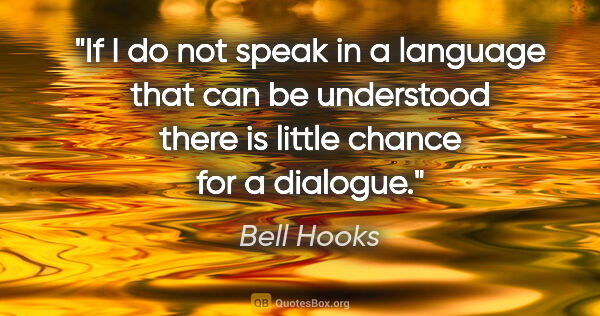Dialogue Quotes (page 4)
What to Accept. The fact of mountains. The actuality. Of any stone? by kicking, if necessary. The need to ignore stupid people, While restraining one's natural impulse. To murder them. The change from your dollar, Be it no more than a penny, For without a pretense of universal penury. There can be no honor between rich and poor. Love, unconditionally, or until proven false. The inevitability of cancer and/or. Heart disease. The dialogue as written, Once you've taken the role. Failure,...
Thomas M. Disch
A poem, as a manifestation of language and thus essentially dialogue, can be a message in a bottle, sent out in the –not always greatly hopeful-belief that somewhere and sometime it could wash up on land, on heartland perhaps. Poems in this sense too are under way: they are making toward something. Toward what? Toward something standing open, occupiable, perhaps toward an addressable Thou, toward an addressable reality.
Paul Celan
The good is twice described in the Philebus as perfect, self- sufficient and seeked by all conscious beings. And the good does not have a contrary: it is not the one end of a scale whose evil would be the other end; it is a measure on any scale."Taken from Bernard Suzanne. Plato and his dialogues. Pursuing Goodness or the Good. Updated Nov 21, 1998
Plato
The Wit of Cheats, the Courage of a Whore, Are what ten thousand envy and adore: All, all look up, with reverential Awe, At crimes that 'scape, or triumph o'er the Law: While Truth, Worth, Wisdom, daily they decry-`'Nothing is sacred now but Villainy'- Epilogue to the Satires, Dialogue I
Alexander Pope
I remember asking myself one night, while I was curled up in the same old corner of my same old couch in tears yet again over the same old repetition of sorrowful thoughts, 'Is there ANYTHING about this scene you can change, Liz?' And all I could think to do was stand up, whle still sobbing, and try to balance on one foot in the middle of the living room. Just to prove that - while I couldn't stop the tears or change my dismal interior dialogue - I was not yet totally out of control: at least...
Elizabeth Gilbert
Writing has always been a serious business for me. I felt it was a moral obligation. A major concern of the time was the absence of the African voice. Being part of that dialogue meant not only sitting at the table but effectively telling the African story from an African perspective - in full earshot of the world.
Chinua Achebe
But, you say, there is very little conversation in this book. Why isn't there more dialoge? What we want in a book by this citizen is people talking; that is all he knows how to do and now he doesn't do it. The fellow is no philosopher, no savant, an incompetent zoologist, he drinks too much and cannot punctuate readily and now he has stopped writing dialogue. Some one ought to put a stop to him. He is bull crazy.
Ernest Hemingway

Until then I had thought each book spoke of the things, human or divine, that lie outside books. Now I realized that not infrequently books speak of books: it is as if they spoke among themselves. In the light of this reflection, the library seemed all the more disturbing to me. It was then the place of a long, centuries-old murmuring, an imperceptible dialogue between one parchment and another, a living thing, a receptacle of powers not to be ruled by a human mind, a treausre of secrets...
Umberto Eco
Without God man neither knows which way to go, nor even understands who he is... One of the deepest forms of poverty a person can experience is isolation... Poverty is often produced by a rejection of God's love, by man's basic and tragic tendency to close in on himself, thinking himself to be self-sufficient or merely an insignificant and ephemeral fact, a "stranger" in a random universe...The human being develops when ... his soul comes to know itself and the truths that God has implanted...
Joseph Ratzinger
…modern man no longer communicates with the madman […] There is no common language: or rather, it no longer exists; the constitution of madness as mental illness, at the end of the eighteenth century, bears witness to a rupture in a dialogue, gives the separation as already enacted, and expels from the memory all those imperfect words, of no fixed syntax, spoken falteringly, in which the exchange between madness and reason was carried out. The language of psychiatry, which is a monologue by...
Michel Foucault
